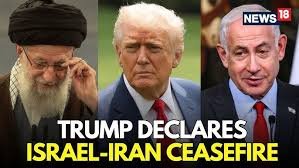A new wave of diplomatic confusion has swept the Middle East after former U.S. President Donald Trump announced that Iran and Israel had reached a ceasefire agreement — a claim Tehran immediately denied.
In a post on his Truth Social platform on Monday, Trump declared a “Complete and Total CEASEFIRE” had been agreed upon by both nations, saying it would begin at approximately 4:00 a.m. GMT on Tuesday, effectively ending what he termed a “12-day war.”
But within hours, Iranian Foreign Minister Abbas Araghchi publicly refuted the claim, stating there was no formal agreement and accusing Israel of initiating the conflict.
“As of now, there is NO ‘agreement’ on any ceasefire or cessation of military operations,” Araghchi posted on X (formerly Twitter). “However, provided that the Israeli regime stops its illegal aggression against the Iranian people no later than 4 a.m. Tehran time, we have no intention to continue our response afterwards.”
The Iranian government suggested it might halt further hostilities if Israel withdrew from offensive actions, but emphasized that a final decision was pending.
Israel has yet to issue an official response to either Trump’s announcement or Iran’s clarification.
The conflict, which began on June 13 following Israeli airstrikes on Iranian nuclear facilities, has spiraled into a regional crisis. Tehran retaliated with multiple missile attacks, including a significant escalation on Sunday when it struck a U.S. military base in Qatar housing American forces.
Iranian authorities claim over 400 people, including at least 13 children, have been killed in the conflict, with more than 3,000 injured. In Israel, officials have confirmed 24 deaths from Iranian strikes.
The international community remains on edge as the situation teeters between a fragile de-escalation and a broader regional war, with many awaiting clarifications from Tel Aviv and Washington.











